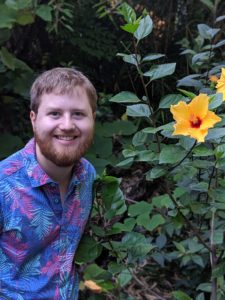 a. What is your background? Where are you from? What do you study? What are you most interested in, scientifically?
a. What is your background? Where are you from? What do you study? What are you most interested in, scientifically?
Hello! I am an ecologist finishing a M.S. degree in Biology at Western Washington University in Bellingham, WA, USA. My thesis research focuses on the ecology and physiology of marine algae in the Gulf of Alaska, a beautiful and dynamic study system! While I have enjoyed my weeks at sea, I am equally passionate about bringing science to a general audience and have recently shifted my research focus to study factors affecting STEM literacy and equity, inclusive and inquiry-based pedagogy, and evolution education.
b. Give us a brief summary of your internship project. What is the study system? Primary research questions? With whom are you working?
For my internship, I have the privilege of working Dr. Sehoya Cotner at the University of Minnesota and an AH-MAZING bunch of community college faculty! We are studying the effects of COVID-19 on STEM education by surveying community college professors at institutions in the USA to identify 1) How faculty responded to, and were affected by, the emergency transition to remote instruction brought on by COVID-19 and 2) What resources and support community college faculty to move forward with remote and/or hybrid instruction.
c. What is your role in the research team in terms of tasks and responsibilities, and how do these relate to the aims of the research project?
I started the internship doing QA/QC of survey data collected by Dr. Cotner and colleagues and have since worked to visualize and analyze qualitative and quantitative data using a mixed methods triangulation approach. With these results in hand, I realized that I did not know enough about the community college experience to interpret these data with the appropriate level of detail! To interpret these data better, I formed and am currently leading a focus group of community college faculty from several institutions in the USA. Leading this focus group has been such a rewarding experience and has yielded many useful insights into the struggle of community college faculty during this difficult transitional experience and has greatly improved the interpretation of our survey data. All these tasks move us one step forward to communicating our results to the larger STEM education community and providing strategies for community college faculty teaching this coming Fall.
d. What were your specific goals for the upcoming internship? These can be both scientific and personal. Are you meeting, or did you (if the internship is complete) accomplish your goals? Please explain with specific examples if possible.
The goals I had entering my internship included: 1) Learning how to analyze survey data containing quantitative and qualitative data, 2) Networking with colleagues from multiple institutions, and 3) Getting back into pedagogical research. I took a hiatus from pedagogical research to pursue my M.S. degree and had really missed performing research that has far-reaching implications and was directed towards practitioners of science. It has been great to discuss STEM education and be a part of a lab that freely circulates ideas, connects like-minded individuals, and is a leader in promoting STEM literacy. Not only have I re-connected with old colleagues that were instrumental in my undergraduate career, I have met new colleagues both at the university and community college level. These connections have been critical to my understanding of survey data analysis and I am confident that they will remain an important component of my future scientific endeavors.
e. What skills or knowledge from your prior experience and education did you find useful during this internship? Did you develop any new skills or knowledge? Please explain.
 I came into this internship with some knowledge of descriptive statistics for survey data and R coding. I also came in with experience visualizing data graphically. However, I did not know the appropriate statistics to use to analyze these survey data! Since the internship started, I have had the opportunity to critically think about analytical methods (e.g. mixed methods triangulation) and different ways to statistically analyze these data (e.g. non-parametric tests; mixed models). I have also gained skills in leading a collaboration, time management in a remote working environment, and an appreciation for the challenges facing students and faculty during COVID-19!
I came into this internship with some knowledge of descriptive statistics for survey data and R coding. I also came in with experience visualizing data graphically. However, I did not know the appropriate statistics to use to analyze these survey data! Since the internship started, I have had the opportunity to critically think about analytical methods (e.g. mixed methods triangulation) and different ways to statistically analyze these data (e.g. non-parametric tests; mixed models). I have also gained skills in leading a collaboration, time management in a remote working environment, and an appreciation for the challenges facing students and faculty during COVID-19!
f. How has the COVID19 pandemic altered your plans or your experience during this internship?
Unlike many scientists who have had to cancel field work and remain separated from their university research labs during quarantine, my science is inspired by COVID-19! The emergency transition to remote instruction occurred at nearly every institute in the USA in March/April and continues to wreak havoc on the future of STEM education. Our work is timely and salient, and I hope to be able to share results soon!
Greetings from Norway, Clay! It is really inrteresting ot read about your project, and you are right about most of us thinking about how COVID has hampered our research, while your was inspired from it. Excited to see the results as they come out!